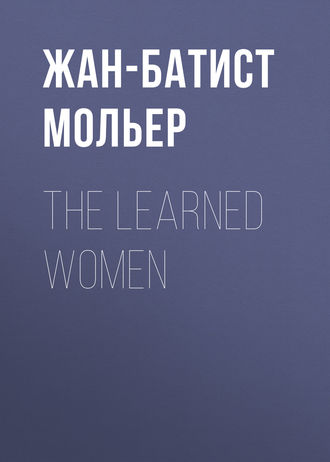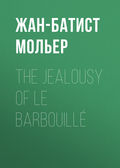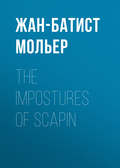
Мольер (Жан-Батист Поклен)
The Learned Women
SCENE VII. – PHILAMINTE, CHRYSALE, BÉLISE
CHRY. She is gone, and you are satisfied, but I do not approve of sending her away in this fashion. She answers very well for what she has to do, and you turn her out of my house for a trifle.
PHI. Do you wish me to keep her for ever in my service, for her to torture my ears incessantly, to infringe all the laws of custom and reason, by a barbarous accumulation of errors of speech, and of garbled expressions tacked together with proverbs dragged out of the gutters of all the market-places?
BEL. It is true that one sickens at hearing her talk; she pulls Vaugelas to pieces, and the least defects of her gross intellect are either pleonasm or cacophony.
CHRY. What does it matter if she fails to observe the laws of Vaugelas, provided she does not fail in her cooking? I had much rather that while picking her herbs, she should join wrongly the nouns to the verbs, and repeat a hundred times a coarse or vulgar word, than that she should burn my roast, or put too much salt in my broth. I live on good soup, and not on fine language. Vaugelas does not teach how to make broth; and Malherbe and Balzac, so clever in learned words, might, in cooking, have proved themselves but fools. [Footnote: Malherbe, 1555-1628; Balzac, 1594-1654.]
PHI. How shocking such a coarse speech sounds; and how unworthy of one who calls himself a man, to be always bent on material things, instead of rising towards those which are intellectual. Is that dross, the body, of importance enough to deserve even a passing thought? and ought we not to leave it far behind?
CHRY. Well, my body is myself, and I mean to take care of it; dross if you like, but my dross is dear to me.
BEL. The body and the mind, brother, exist together; but if you believe all the learned world, the mind ought to take precedence over the body, and our first care, our most earnest endeavour, must be to feed it with the juices of science.
CHRY. Upon my word, if you talk of feeding your mind, you make use of but poor diet, as everybody knows; and you have no care, no solicitude for…
PHI. Ah! Solicitude is unpleasant to my ear: it betrays strangely its antiquity. [Footnote: Many of the words condemned by the purists of the time have died out; solicitude still remains.]
BEL. It is true that it is dreadfully starched and out of fashion.
CHRY. I can bear this no longer. You will have me speak out, then? I will raise the mask, and discharge my spleen. Every one calls you mad, and I am greatly troubled at…
PHI. Ah! what is the meaning of this?
CHRY. (to BÉLISE). I am speaking to you, sister. The least solecism one makes in speaking irritates you; but you make strange ones in conduct. Your everlasting books do not satisfy me, and, except a big Plutarch to put my bands in [Footnote: To keep them flat.], you should burn all this useless lumber, and leave learning to the doctors of the town. Take away from the garret that long telescope, which is enough to frighten people, and a hundred other baubles which are offensive to the sight. Do not try to discover what is passing in the moon, and think a little more of what is happening at home, where we see everything going topsy-turvy. It is not right, and that too for many reasons, that a woman should study and know so much. To form the minds of her children to good manners, to make her household go well, to look after the servants, and regulate all expenses with economy, ought to be her principal study, and all her philosophy. Our fathers were much more sensible on this point: with them, a wife always knew enough when the extent of her genius enabled her to distinguish a doublet from a pair of breeches. She did not read, but she lived honestly; her family was the subject of all her learned conversation, and for hooks she had needles, thread, and a thimble, with which she worked at her daughter's trousseau. Women, in our days, are far from behaving thus: they must write and become authors. No science is too deep for them. It is worse in my house than anywhere else; the deepest secrets are understood, and everything is known except what should be known. Everyone knows how go the moon and the polar star, Venus, Saturn, and Mars, with which I have nothing to do. And in this vain knowledge, which they go so far to fetch, they know nothing of the soup of which I stand in need. My servants all wish to be learned, in order to please you; and all alike occupy themselves with anything but the work they have to do. Reasoning is the occupation of the whole house, and reasoning banishes all reason. One burns my roast while reading some story; another dreams of verses when I call for drink. In short, they all follow your example, and although I have servants, I am not served. One poor girl alone was left me, untouched by this villainous fashion; and now, behold, she is sent away with a huge clatter because she fails to speak Vaugelas. I tell you, sister, all this offends me, for as I have already said, it is to you I am speaking. I dislike to see all those Latin-mongers in my house, and particularly Mr. Trissotin. It is he who has turned your heads with his verses. All his talk is mere rubbish, and one is for ever trying to find out what he has said after he has done speaking. For my part I believe that he is rather cracked.
PHI. What coarseness, O heavens! both in thought and language.
BEL. Can there be a more gross assemblage of corpuscles, [Footnote: A reference to the corpuscular philosophy] a mind composed of more vulgar atoms? Is it possible that I can come from the same blood? I hate myself for being of your race, and out of pure shame I abandon the spot.
SCENE VIII. – PHILAMINTE, CHRYSALE
PHI. Have you any other shaft ready?
CHRY. I? No. Don't let us dispute any longer. I've done. Let's speak of something else. Your eldest daughter shows a dislike to marriage; in short, she is a philosopher, and I've nothing to say. She is under good management, and you do well by her. But her younger sister is of a different disposition, and I think it would be right to give Henriette a proper husband, who…
PHI. It is what I have been thinking about, and I wish to speak to you of what I intend to do. This Mr. Trissotin on whose account we are blamed, and who has not the honour of being esteemed by you; is the man whom I have chosen to be her husband; and I can judge of his merit better than you can. All discussion is superfluous here, for I have duly resolved that it should be so. I will ask you also not to say a word of it to your daughter before I have spoken to her on the subject. I can justify my conduct, and I shall be sure to know if you have spoken to her.
SCENE IX. – ARISTE, CHRYSALE
ARI. Well! your wife has just left, and I see that you must have had a talk together.
CHRY. Yes.
ARI. And how did you succeed? Shall we have Henriette? Has she given her consent? Is the affair settled?
CHRY. Not quite as yet.
ARI. Does she refuse?
CHRY. No.
ARI. Then she hesitates?
CHRY. Not in the least.
ARI. What then?
CHRY. Well! she offers me another man for a son-in-law.
ARI. Another man for a son-in-law?
CHRY. Yes.
ARI. What is his name?
CHRY. Mr. Trissotin.
ARI. What! that Mr. Trissotin…
CHRY. Yes, he who always speaks of verse and Latin.
ARI. And you have accepted him?
CHRY. I? Heaven forbid!
ARI. What did you say to it?
CHRY. Nothing. I am glad that I did not speak, and commit myself.
ARI. Your reason is excellent, and it is a great step towards the end we have in view. Did you not propose Clitandre to her?
CHRY. No; for as she talked of another son-in-law, I thought it was better for me to say nothing.
ARI. Your prudence is to the last degree wonderful! Are you not ashamed of your weakness? How can a man be so poor-spirited as to let his wife have absolute power over him, and never dare to oppose anything she has resolved upon?
CHRY. Ah! it is easy, brother, for you to speak; you don't know what a dislike I have to a row, and how I love rest and peace. My wife has a terrible disposition. She makes a great show of the name of philosopher, but she is not the less passionate on that account; and her philosophy, which makes her despise all riches, has no power over the bitterness of her anger. However little I oppose what she has taken into her head, I raise a terrible storm which lasts at least a week. She makes me tremble when she begins her outcries; I don't know where to hide myself. She is a perfect virago; and yet, in spite of her diabolical temper, I must call her my darling and my love.
ARI. You are talking nonsense. Between ourselves, your wife has absolute power over you only because of your own cowardice. Her authority is founded upon your own weakness; it is from you she takes the name of mistress. You give way to her haughty manners, and suffer yourself to be led by the nose like a fool. What! you call yourself a man, and cannot for once make your wife obey you, and have courage enough to say, "I will have it so?" You will, without shame, see your daughter sacrificed to the mad visions with which the family is possessed? You will confer your wealth on a man because of half-a-dozen Latin words with which the ass talks big before them – a pedant whom your wife compliments at every turn with the names of wit and great philosopher whose verses were never equalled, whereas everybody knows that he is anything but all that. Once more I tell you, it is a shame, and you deserve that people should laugh at your cowardice.
CHRY. Yes, you are right, and I see that I am wrong. I must pluck up a little more courage, brother.
ARI. That's right.
CHRY. It is shameful to be so submissive under the tyranny of a woman.
ARI. Good.
CHRY. She has abused my gentleness.
ARI. It is true.
CHRY. My easy-going ways have lasted too long.
ARI. Certainly.
CHRY. And to-day I will let her know that my daughter is my daughter, and that I am the master, to choose a husband for her according to my mind.
ARI. You are reasonable now, and as you should be.
CHRY. You are for Clitandre, and you know where he lives; send him to me directly, brother.
ARI. I will go at once.
CHRY. I have borne it too long. I will be a man, and set everybody at defiance.
ACT III
SCENE I. – PHILAMINTE, ARMANDE, BÉLISE, TRISSOTIN, LÉPINE
PHI. Ah! Let us sit down here to listen comfortably to these verses; they should be weighed word by word.
ARM. I am all anxiety to hear them.
BEL. And I am dying for them.
PHI. (to TRISSOTIN). Whatever comes from you is a delight to me.
ARM. It is to me an unparalleled pleasure.
BEL. It is a delicious repast offered to my ears.
PHI. Do not let us languish under such pressing desires.
ARM. Lose no time.
BEL. Begin quickly and hasten our pleasure.
PHI. Offer your epigram to our impatience.
TRI. (to PHILAMINTE). Alas! it is but a new-born child, Madam, but its fate ought truly to touch your heart, for it was in your court-yard that I brought it forth, but a moment since.
PHI. To make it dear to me, it is sufficient for me to know its father.
TRI. Your approbation may serve it as a mother.
BEL. What wit he has!
SCENE II. – HENRIETTE, PHILAMINTE, ARMANDE, BÉLISE, TRISSOTIN, LÉPINE
PHI. (to HENRIETTE, who is going away). Stop! why do you run away?
HEN. I fear to disturb such sweet intercourse.
PHI. Come nearer, and with both ears share in the delight of hearing wonders.
HEN. I have little understanding for the beauties of authorship, and witty things are not in my line.
PHI. No matter. Besides, I wish afterwards to tell you of a secret which you must learn.
TRI. (to HENRIETTE). Knowledge has nothing that can touch you, and your only care is to charm everybody.
HEN. One as little as the other, and I have no wish…
BEL. Ah! let us think of the new-born babe, I beg of you.
PHI. (to LÉPINE). Now, little page, bring some seats for us to sit down. (LÉPINE slips down.) You senseless boy, how can you fall down after having learnt the laws of equilibrium?
BEL. Do you not perceive, ignorant fellow, the causes of your fall, and that it proceeds from your having deviated from the fixed point which we call the centre of gravity?
LEP. I perceived it, Madam, when I was on the ground.
PHI. (to LÉPINE, who goes out). The awkward clown!
TRI. It is fortunate for him that he is not made of glass.
ARM. Ah! wit is everything!
BEL. It never ceases. (They sit down.)
PHI. Serve us quickly your admirable feast.
TRI. To satisfy, the great hunger which is here shown to me, a dish of eight verses seems but little; and I think that I should do well to join to the epigram, or rather to the madrigal, the ragout of a sonnet which, in the eyes of a princess, was thought to have a certain delicacy in it. It is throughout seasoned with Attic salt, and I think you will find the taste of it tolerably good.
ARM. Ah! I have no doubt of it.
PHI. Let us quickly give audience.
BEL. (interrupting TRISSOTIN each time he is about to read). I feel, beforehand, my heart beating for joy. I love poetry to distraction, particularly when the verses are gallantly turned.
PHI. If we go on speaking he will never be able to read.
TRI. SONN…
BEL. (to HENRIETTE). Be silent, my niece.
ARM. Ah! let him read, I beg.
TRI. SONNET TO THE PRINCESS URANIA ON HER FEVER.1
Your prudence fast in sleep's repose
Is plunged; if thus superbly kind,
A lodging gorgeously you can find
For the most cruel of your foes —
"Votre prudence est endormie,
De traiter magnifiquement,
Et de loger superbement,
Votre plus cruelle ennemie;
Faites-la sortir quoi qu'on die,
De votre riche appartement,
Où cette ingrate insolemment
Attaque votre belle vie!
Quoi! sans respecter votre rang,
Elle se prend à votre sang,
Et nuit et jour vous fait outrage!
Si vous la conduisez aux bains,
Sans la marchander davantage,
Noyez-la de vos propres mains."
BEL. Ah! what a pretty beginning!
ARM. What a charming turn it has!
PHI. He alone possesses the talent of making easy verses.
ARM. We must yield to prudence fast in sleep's repose is plunged.
BEL. A lodging for the most cruel of your foes is full of charms for me.
PHI. I like superbly and gorgeously; these two adverbs joined together sound admirably.
BEL. Let us hear the rest.
TRI.
Your prudence fast in sleep's repose
Is plunged; if thus superbly kind,
A lodging gorgeously you can find
For the most cruel of your foes
ARM. Prudence asleep!
BEL. Lodge one's enemy!
PHI. Superbly and gorgeously!
TRI.
Will she, nill she, quick, out she goes!
From your apartment richly lined,
Where that ingrate's outrageous mind
At your fair life her javelin throws.
BEL. Ah! gently. Allow me to breathe, I beseech you.
ARM. Give us time to admire, I beg.
PHI. One feels, at hearing these verses, an indescribable something which goes through one's inmost soul, and makes one feel quite faint.
ARM. Will she, nill she, quick, out she goes From your apartment richly lined. How prettily rich apartment is said here, and with what wit the metaphor is introduced!
PHI. Will she, nill she, quick, out she goes! Ah! in what admirable taste that will she, nill she, is! To my mind the passage is invaluable.
ARM. My heart is also in love with will she, nill she.
BEL. I am of your opinion; will she, nill she, is a happy expression.
ARM. I wish I had written it.
BEL. It is worth a whole poem!
PHI. But do you, like me, understand thoroughly the wit of it?
ARM. and BEL. Oh! oh
PHIL. Will she, nill she, quick, out she goes! Although another should take the fever's part, pay no attention; laugh at the gossips; will she, nill she, quick, out she goes. Will she, nill she, will she, nill she. This will she, nill she, says a great deal more than it seems. I do not know if every one is like me, but I discover in it a hundred meanings.
BEL. It is true that it says more than its size seems to imply.
PHI. (to TRISSOTIN). But when you wrote this charming Will she, nill she, did you yourself understand all its energy? Did you realise all that it tells us, and did you then think that you were writing something so witty?
TRI. Ah! ah!
ARM. I have likewise the ingrate in my head; this ungrateful, unjust, uncivil fever that ill-treats people who entertain her.
PHI. In short, both the stanzas are admirable. Let us come quickly to the triplets, I pray.
ARM. Ah! once more, will she, nill she, I beg.
TRI. Will she, nill she, quick, out she goes!
PHI., ARM. and BEL. Will she, nill she!
TRI. From your apartment richly lined.
PHI., ARM. and BEL. Rich apartment!
TRI. Where that ingrate's outrageous mind.
PHI., ARM. and BEL. That ungrateful fever!
TRI. At your fair life her javelin throws.
PHI. Fair life!
ARM. and BEL. Ah!
TRI.
What! without heed for your high line,
She saps your blood with care malign…
PHI., ARM. and BEL. Ah!
TRI.
Redoubling outrage night and day!
If to the bath you take her down,
Without a moment's haggling, pray,
With your own hands the miscreant drown.
PHI. Ah! it is quite overpowering.
BEL. I faint.
ARM. I die from pleasure.
PHI. A thousand sweet thrills seize one.
ARM. If to the bath you take her down,
BEL. Without a moment's haggling, pray,
PHI. With your own hands the miscreant drown. With your own hands, there, drown her there in the bath.
ARM. In your verses we meet at each step with charming beauty.
BEL. One promenades through them with rapture.
PHI. One treads on fine things only.
ARM. They are little lanes all strewn with roses.
TRI. Then the sonnet seems to you…
PHI. Admirable, new; and never did any one make anything more beautiful.







